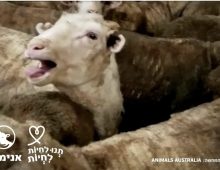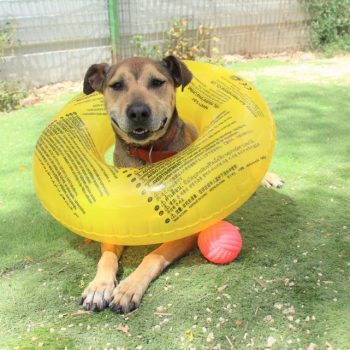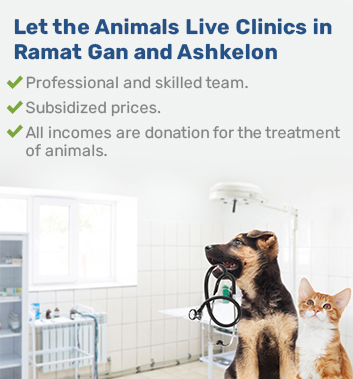
For years, “Let the Animals Live” has been urging the Ministry of Agriculture to come up with a humane, long-term governmental plan for the treatment of free-roaming dogs in Israel. In the absence of any official data regarding the number of free-roaming dogs, in 2017 “Let the Animals Live” conducted a survey in collaboration with the “Humane Society International” in order to count the free-roaming dogs’ population. The result of that survey showed that there are approximately 32,800 free-roaming dogs in Israel, about 20,000 of them located in Israel’s southern region. Since then, no data regarding the dogs’ number has been collected. The current state of emergency caused by the Gaza war put on the table the gravity of the free-roaming dogs’ situation in the southern region.
During October, following the Hamas attack in Israel, following the breach of the border fence with Gaza, and later the lack of food in the Gaza Strip, free-roamingfree-roaming dogs began to cross to the Israeli territory. As the southern towns and villages were evacuated, the dogs felt comfortable roaming the area in search of food. The first media reports on the issue began in December, where the Ministry of Agriculture gave its estimate that about 500 dogs had entered from the Gaza Strip. In a hearing in the Knesset’s education committee, the Ministry claimed that 2.1 million NIS would be allocated to treating these dogs – for sheltering, neutering, vaccination etc. For two whole months no steps were taken to deal with the free-roaming dogs’ population. As published in media outlets in February, the Ministry estimation grew to that of about 5,000 dogs had crossed the fence. In interviews with the media, the Chief Veterinarian, Dr. Tamir Goshen, said that 90% of the dogs are not adoptable and therefore “there is no choice but conducting a mass killing”. It was also exposed that the money promised was allocated to “unadoptable dogs” – thus, for the killing of them.
Not long after Dr. Goshen’s interview, the Ministry of Agriculture published a bill that would allow the killing of dogs captured in the territories close to Gaza (and potentially near the Lebanon border in the north). The Ministry set an extremely short period of one week for public comments. Nevertheless, some 1,300 comments opposing the bill were submitted. On normal days, when a free-roaming dog is caught, it is transferred to a municipal authority kennel, where it stays for 10 days, a period meant to examine whether the dog can be put up for adoption or transferred to an animal shelter or to the defence forces, and if this isn’t possible, to kill it. The bill seeks to cancel for a year the ten-day period, to make it possible to kill the dog on the day of its capture. The bill also sets a mechanism through which the Minister of Agriculture could announce a similar arrangement to take place near the border with Lebanon in the northern region, even though there is no data suggesting a change in the situation of free-roaming dogs in this area. On March 4, 2024, the government-sponsored bill passed in first reading, with a majority of six Knesset members against two.
The bill is based in no facts or data supporting it. It bill refers to an unbased ‘estimated’ data. How can the Ministry know how many of the free-roaming dogs were in Israel before the war, how many entered since the war, and how is it possible to distinguish between dogs from Gaza and dogs from Israel? How is it possible to determine that 90% of the dogs are not adoptable without them being examined? Without sufficient data, the picture that emerges is that the Ministry of Agriculture is taking advantage of the state of emergency in order to solve a problem that has been neglected for many years.
With respect to the threat of rabies, as mentioned, for years tens of thousands of free-roaming dogs have been roaming in the Southern District, within which not a single incident of rabies has been reported. The last rabies incident in the south occurred in 2010. There is also no data suggesting rabies is a problem in Gaza. Additionally, the bill would not be effective in preventing rabies and reducing the free-roaming dogs population. The mass killing, which, apart from being incredibly cruel, does not provide an effective long-term solution. The killing of dogs cannot be a permanent solution since it does not interrupt their natural reproduction, and it allows the entering of new unknown dogs to the area. The Ministry of Agriculture does not confront this problem, and it seems that from its point of view the killing policy can last forever.
An effective, humane, and efficient solution to the current free-roaming dogs’ crisis should be based on research, data, and other countries and organizations experience. Alternative solutions could include neutering (which has been opposed by the Ministry of Agriculture for many years), sanitation operations, ongoing research, and a science-based program to reduce and manage the free-roaming dogs population, including food supply and management in and near Gaza during the war. Either way, it is clear that mass killing cannot be the solution.
















